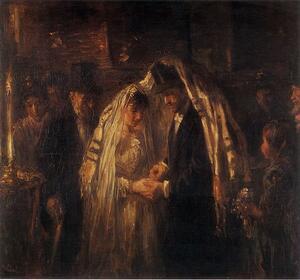What makes a marriage?
"A Jewish Wedding" by Jozef Israëls (1824–1911) painted in 1903.
Courtesy of Jewish Art, edited by Grace Cohen Grossman; Wikimedia Commons.
A couple weeks ago, while visiting my parents over the holidays, I overheard something very disturbing. As I made my way from the dining room (occupied by the younger generation) back to the kitchen for a second helping of Indian takeout, I overheard my mother say to the table, "You know, I'm not opposed to arranged marriage."
A dollop of lamb saag dropped off my spoon onto the counter, along with my jaw. Had the masala gone to her head? My mother can't even pick out a sweater for me, nevermind a husband. But then again, I'm not even sure what I'm looking for in a husband, or even that I know what I think about marriage at all. This morning, however, The New York Times offered a clue.
In "The Happy Marriage Is the ‘Me’ Marriage," Dr. Arthur Aron, a psychology professor who directs the Interpersonal Relationships Laboratory at the State University of New York at Stony Brook, says that while factors like communication skills, mental health, social support, and stress may impact the likelihood a marraige will last, they do not necessarily make it more meaningful, enjoyable or sustaining.
Dr. Aron and Gary W. Lewandowski Jr., a professor at Monmouth University in New Jersey, study a process called “self-expansion," in which one accumulates knowledge and new experiences through their relationship. For example, having a partner who is a community volunteer or activist may encourage you to join up. A partner who is playful and spontaneous may pass along some of those traits to you. And likewise, your hobbies and traits may help to enrich your partner's life in return. Their research shows that the more self-expansion we experience from our partner, the more committed and satisfied we are in the relationship.
The article seems to imply that we are no longer satisfied with marriages that last; we want marriages that are fulfilling and partners who make each other's lives more interesting. Any relationship can last if you put enough work into it, but we don't want to work to enrich our marriages, we want our marriages to enrich us.
Jill at Feministe claims this as a victory for feminism. At first I wasn't sure, but I think I understand that sentiment. The idea about "marriage that lasts" could be interpreted as anti-feminist. Our society's fear of the "old maid," "spinster," or "single woman" creates a stigma that often keeps women in bad or "blah" marriages. Other sexist ideas tell women that if a marriage has lost its spark, it's her fault and she should buy some sexy lingerie or take a pole dancing class to spice it up. Getting back to my mother's frightening comment, I have heard it said (although I do not know how true this really is) that arranged marriages tend to last.
Okay, I know my mother was kidding and only wants the best for me, but I am glad that most Jews no longer rely on matchmakers (unless we hire the services of Patti Stranger, of course) to decide our fates. I am also glad that researchers like Dr. Aron and Dr. Lewandowski Jr. have been able to put their finger on what really makes a marriage sustainable. Now I know what to look for moving forward: a partner who's interests, hobbies, and personality enrich my own. That, or a dog; either way, I'll be choosing for myself.







